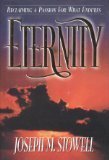Eternity: Reclaiming a Passion for What Endures.By Joseph M. Stowell. Chicago, IL: Moody Press, 1995. 244 pp. Cloth, $12.95.
This is an important book. Not because it is replete with “exegetical breakthroughs” or because it contains a plethora of scholarly insights, but rather because it calls the reader to focus on what every believer should always focus on! It is a manifesto calling evangelicals to build their lives on a God/heaven-centered world view.
Dr. Stowell begins by retelling of the story of Scott and Janet Willis, who lost six children in the flaming wreckage of a freak highway accident in 1994. This tragedy was widely reported by the media, not only because of the horror of the multiple deaths involved, but primarily because of the incredible courage and stability that both parents demonstrated in its aftermath. The underlying premise of Stowell’s book is that the spiritual strength that the Willises possessed in the midst of such unexpected trauma was only possible because of their well-ordered faith in the practical reality of heaven as the invisible domain of the sovereign God who works to eternally glorify Himself in and through the events of history on earth.
The book consists of fourteen chapters grouped into four distinct units. The first unit, “In Other Worlds,” functions as an introduction and overview of the major motif of the rest of the book, that there are three distinct “worlds” which the believer must properly integrate in order to live a biblical Christian life. The second unit, “The Eternal World Beyond,” expounds the first of Stowell’s suggested “three worlds”—heaven itself, or “the world to come.” The third unit, “The Eternal World Within,” deals with the second “world”—the believer’s individual spiritual fellowship with Christ now as he lives on earth. The final unit, “This Present World,” describes the fallen kosmos that we currently live in.
Members of GES will note that at times the author definitely blurs the terms of the Gospel, describing Christians as “those who have claimed Christ as Lord of their lives” (p. 17) and specifically referring to one man’s salvation experience as taking place when he “gave his heart to the Lord” (p. 39). Paradoxically, however, throughout the book, Stowell is quite clear that not all Christians have the proper priorities and perspective. Apparently he feels that while all Christians “claim Christ as Lord of their lives” many need this book to help them to follow through on that “claim.” (Wouldn’t it have been better to stand on a statement like Rom 4:5 relative to the terms of the Gospel and then echo the exhortation of a passage like Rom 12:1-2 as the content of the book was developed?)
One major positive theological strength of this book is its direct stand against all forms of the so-called “prosperity gospel,” such as “Fewer things are more unsettling to us than the realization that our righteousness will inevitably cause us to face moments of rejection, discomfort, and in some cases, physical pain—and, as many have, even martyrdom” (p. 227).
One exotic aspect of the book is the author’s breakdown of the Sermon on the Mount in chapter 15 as delineating “ten life perspectives that translate into clear kingdom practices.” This is a somewhat novel approach, and most readers will probably differ in their broad understanding of the Sermon’s form and function.
This book deserves a wide reading. I am convinced that Stowell is correct that an active, eager, yet practical anticipation of heaven (in light of John 14:1-3 and 1 John 2:28-3:3) is fundamental to a stable and spiritually productive life on earth. Pastors reading this book will almost certainly feel led to prepare a sermon series on heaven for their flocks! However this book’s warm style and engaging images will be appreciated by any Christian who needs motivation for seeing his or her life and career as a fleeting but important vehicle for furthering heaven’s interests.
Brad McCoy
Pastor
Tanglewood Bible Fellowship
Duncan, OK

